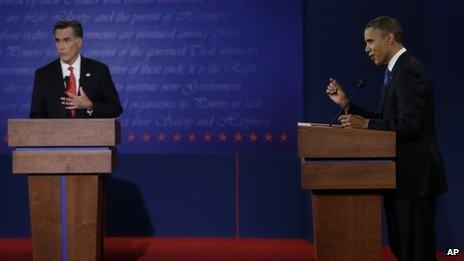Mardell: Good reads for the weekend
- Published

Left-wing journalist Andrew Sullivan's panic-laden article following the first presidential debate set the tone for the week
The article that set the tone for the week was Andrew Sullivan's full on panic, external after the presidential debate.
Much mocked as "Captain of Team Freak Out", his piece nevertheless captures the alarm among Obama supporters. Clearly written in the heat of the moment, it is all the better for that, reflecting the febrile infection that is a tight election.
The former head of the World Bank, Robert Zoellick, has a written an article, external that is fascinating in its own right, but may have greater importance.
He's exploring the idea that foreign policy and national security have become dangerously divorced from economic policy. The added extra is that he is widely tipped to be Romney's secretary of state, and is bound to be an important player if there is a Republican White House.
For all its erudition I am not sure the argument boils down to anything more sophisticated than the thesis that political muscle rest on a strong economy, but judge for yourself.
Romney's own foreign policy speech this past week didn't impress many observers (including me), but commentators at Brookings, external were kinder than many and their range of views are worth a read.
My next choice also comes from Foreign Policy magazine, external. Not very diverse of me, I know, but the argument that a misreading of the Cuban missile crisis has led to a distortion of all subsequent American foreign policy is an important one.
"Who do you want as president?" is not the only question Americans will be asked in November. Salon has a fascinatingly detailed article, external on the referendum in Oregon that could legalize marijuana.
The decades old argument is interesting in its own right, but it is also an example of how state-wide ballots can circumvent America's generally sclerotic and risk-adverse politics to deal with issues most mainstream politicians (Ron Paul and Gary Johnson aside) wouldn't touch with a barge poll.
My last choice exemplifies what adds up to a good read - a combination of lucid, evocative writing with a stimulating, unusual idea.
In the new-ish online magazine Aeon, Professor Liam Heneghan argues, external that "the balance of nature" is a Greek metaphysical concept that has infected the environmental movement but has no place in modern science.
He is not arguing that we are all free to trash the natural world, but that "resilience thinking" provides a more sophisticated approach to environmentalism.